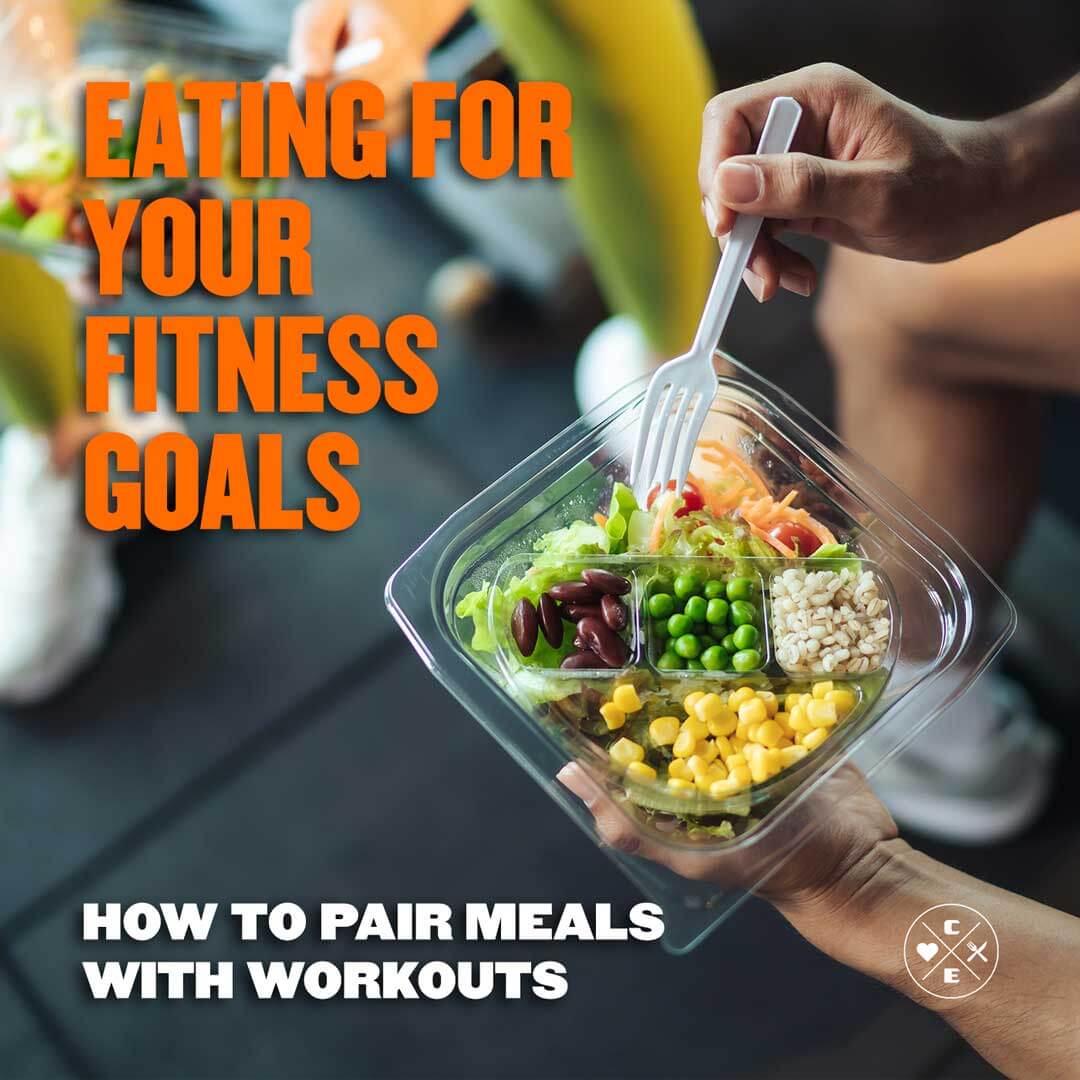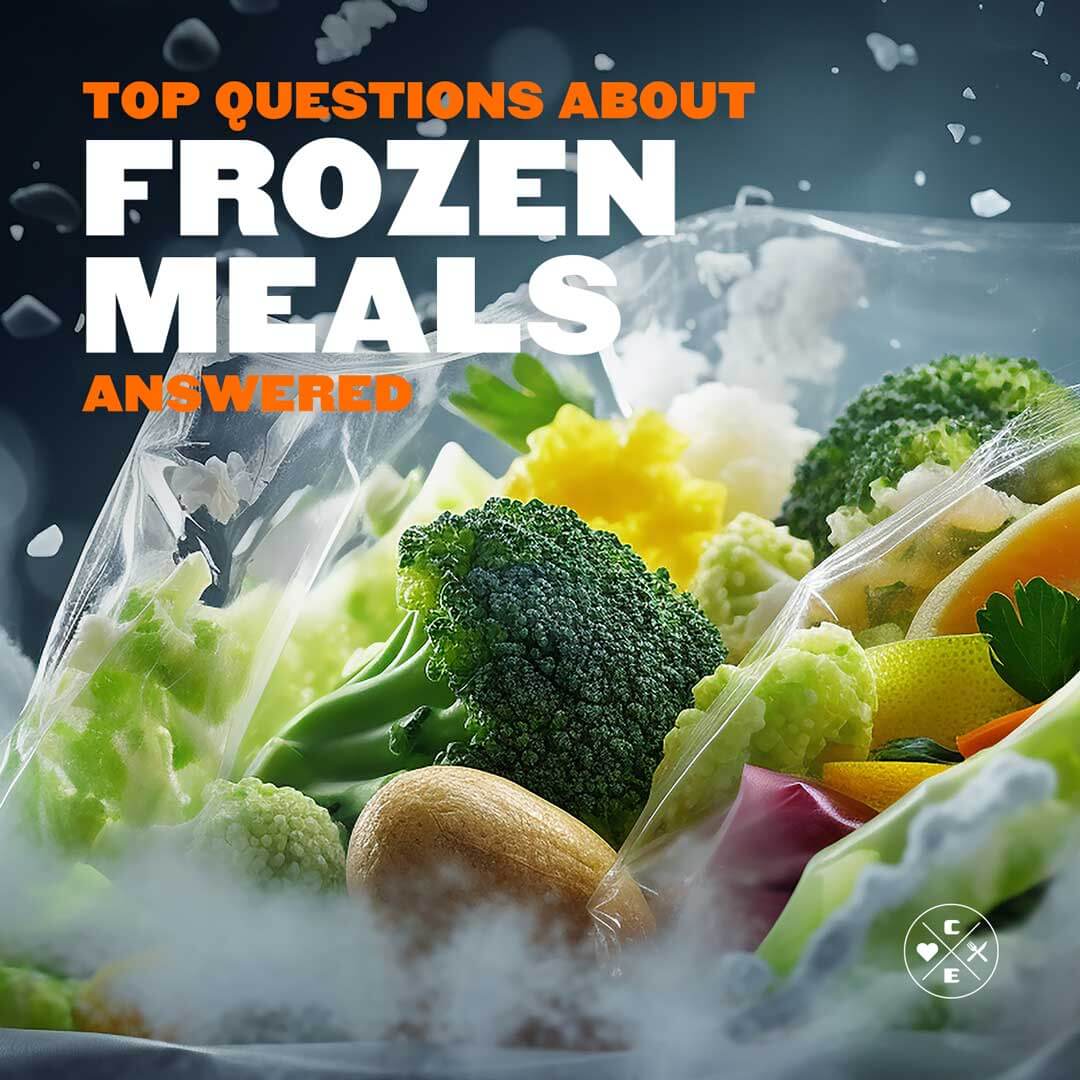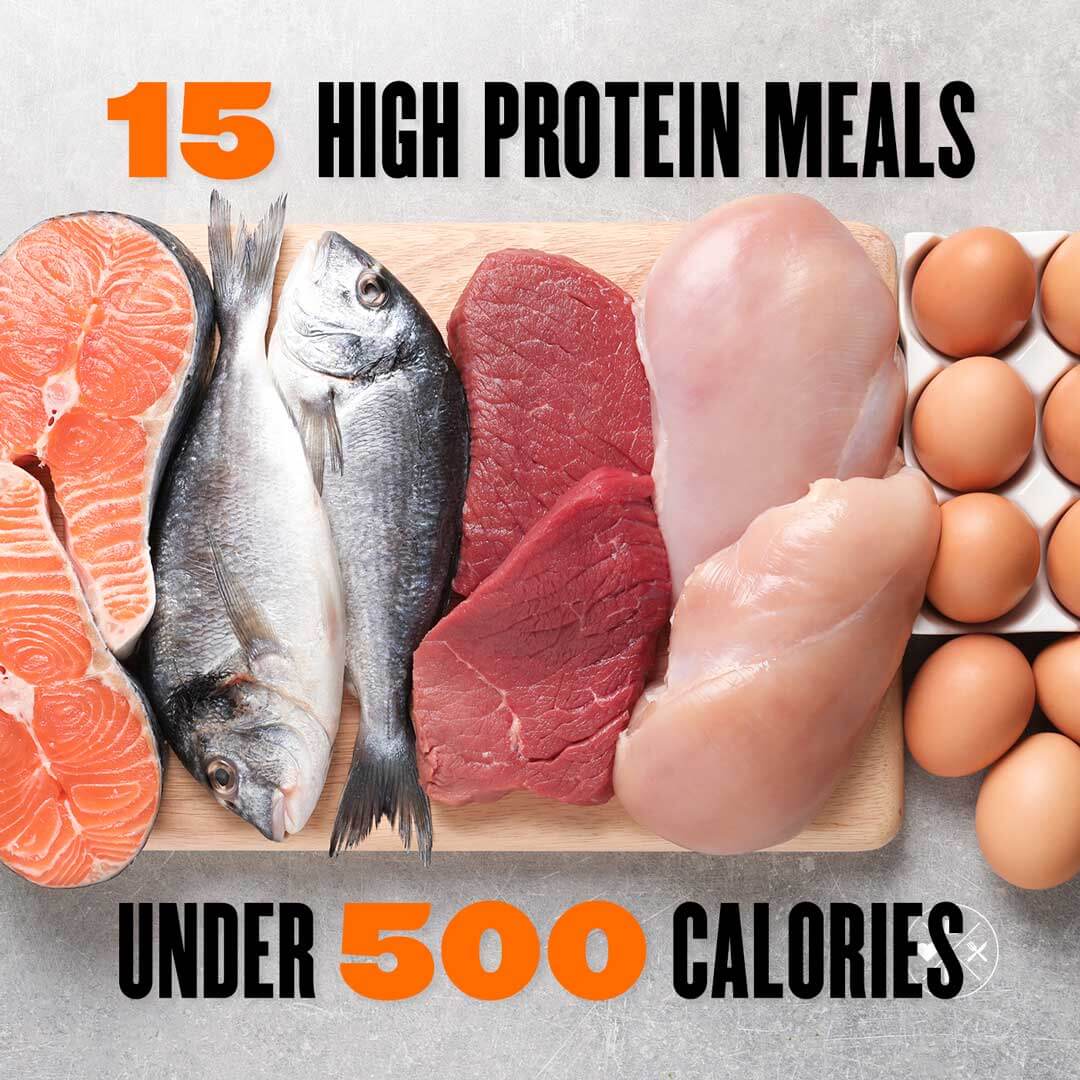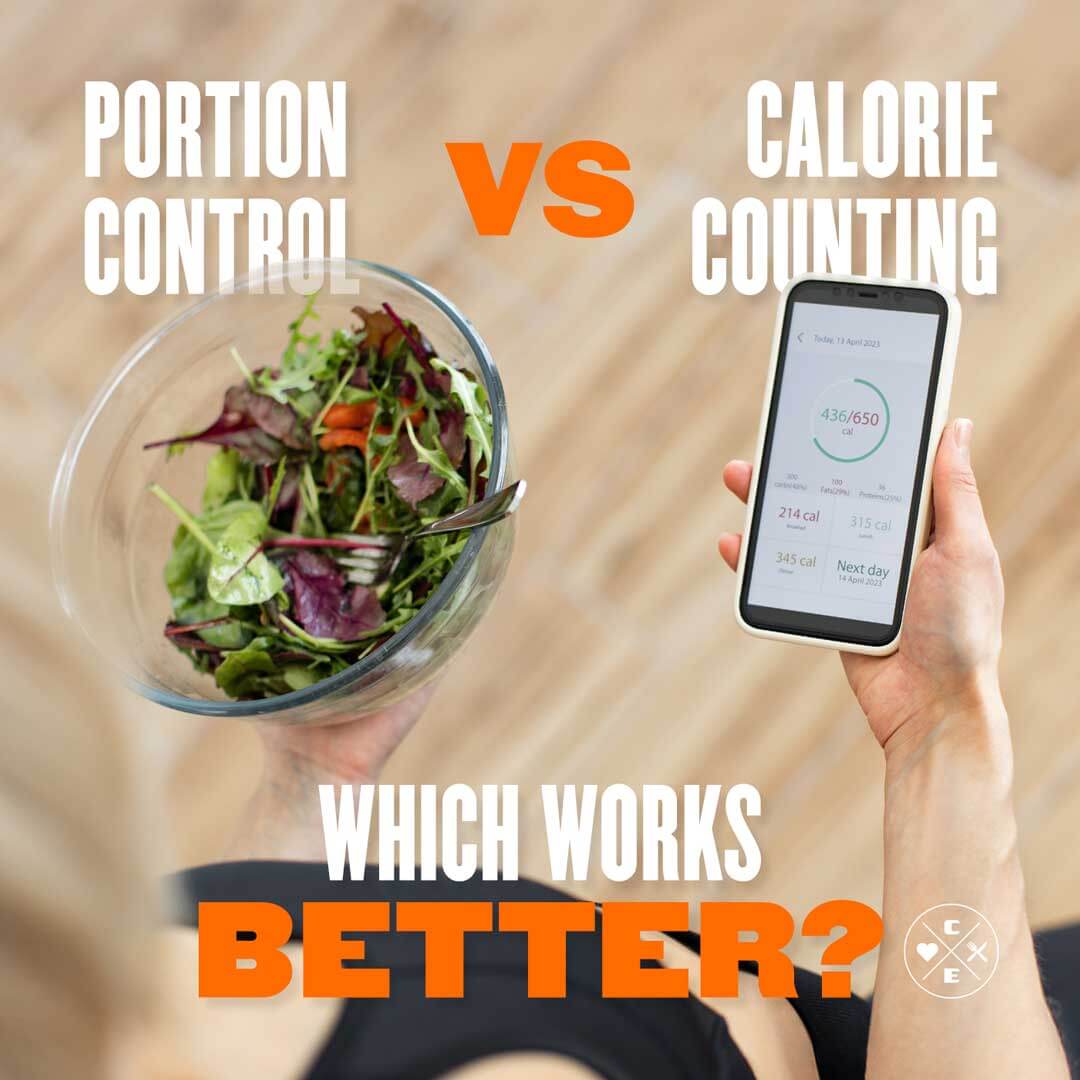
Eating for Your Fitness Goals: How to Pair Meals with Workouts | Clean Eatz Kitchen
Dorothy M. Shirnyl, RND
Nutrition
|
Weight Loss
|
Healthy Lifestyle
16 minute read
You're hitting the gym and putting in the effort, which is awesome! But sometimes, even with all that hard work, you might not be seeing the results you expect. Want to know a secret weapon? It's not just about your workout, it's also about what you eat before and after.
You wouldn't run a marathon without fueling up first, right? The same goes for your regular workouts. Your body needs the right kind of fuel to power through those squats and sprints. And afterwards, it needs the right nutrients to recover and rebuild.
That's where meal timing becomes important. It's all about providing your body with the right nutrients at the right time. Want to lose weight? Gain muscle? Or just have more energy throughout the day? The right foods, eaten strategically, can really make a difference.
In this article, we'll ditch the complicated science jargon and show you how to make meal timing work for you. We'll talk about different workouts, fitness goals, and the best things to eat before, during, and after you exercise. Here, we will learn about the following
Table of Contents
- Know Your Fitness Goals
- The Basics of Nutritional Timing
- Pre-Workout Meals: Fueling Your Body
- During Workout Nutrition: Staying Energized (If Needed)
- Post-Workout Meals: Recovery and Growth
- Nutrition Tips for Specific Workouts
- Common Myths About Workout Nutrition
- Practical Meal Planning Tips
- Conclusion
- Eat for Your Goals!
Know Your Fitness Goals
Before you start planning your meals close to your exercise routine, it's important to take a step back and think about what you're actually trying to achieve. What are your fitness goals?
Here are a few common ones:
- Weight loss or fat loss. You want to shed those extra pounds and feel more confident in your clothes. To do this, your nutrition strategy will likely focus on creating a calorie deficit. This means consuming fewer calories than you burn.
- Muscle building and strength training. You're aiming for bigger muscles, increased strength, and that toned physique. You'll need to provide your body with enough protein to support muscle growth and repair.
- Endurance and performance enhancement. You're focused on running faster, lifting heavier, or lasting longer in your chosen sport or activity. Carbohydrates are your primary fuel source for endurance activities.
- General fitness and well-being/ You want to improve your overall health, boost your energy levels, and just feel better in your body. A balanced diet with a variety of nutrient-dense foods is key here.
See how different goals have different nutritional needs? There's no one-size-fits-all approach. Your meal plan should be as unique as your fitness goals. So take some time to identify your objectives, and then we can start exploring how to fuel your body effectively.
The Basics of Nutritional Timing
So, what exactly is nutritional timing? It's about more than just eating healthy foods—it's about timing those foods strategically around your workouts. By doing this, you can make sure your body has the energy it needs to perform at its best and recover effectively.
There are three main phases to consider when it comes to timing your nutrition around your workouts:
- Pre-workout. This is about eating something before you exercise to give your body energy and prevent muscle breakdown.
- Intra-workout. This applies mostly to longer or more intense workouts. It involves drinking fluids and sometimes having a small snack to keep your energy levels up.
- Post-workout. This is about eating after exercise to help your body recover, rebuild muscle, and replenish energy stores.
The Science Behind Nutrient Absorption And Energy Usage During Exercise
Ever wonder what's really going on inside your body when you're sweating it out at the gym or pushing for that personal best? It's a fascinating process involving energy production, nutrient absorption, and muscle repair. And guess what? What you eat, and when you eat it, can actually have a big impact on this process. Here's a simplified look:
- Energy Demand. As you start working out, your muscles need energy to contract and power your movements.
- Glycogen Breakdown. Your body's primary source of quick energy is glycogen, which is stored carbohydrates in your muscles and liver. Your body starts breaking down glycogen to release glucose, which your muscles use for fuel.
- Nutrient Absorption. If you've eaten before your workout, your body is also busy absorbing nutrients from your food. Carbohydrates are broken down into glucose, which enters your bloodstream and can be used for energy right away or stored as glycogen for later use. Protein gets broken down into amino acids, which are the building blocks for muscle repair and growth.
- Fat Burning. If your workout is long or intense enough, and your glycogen stores start to run low, your body will begin to burn fat for energy.
- Muscle Breakdown and Repair. Exercise, especially strength training, causes tiny tears in your muscle fibers. This is a normal part of the process, and it's how your muscles get stronger. Your body uses amino acids from protein to repair these tears and build new muscle tissue.
Benefits Of Aligning Meals With Workout Schedules
Timing your meals around your workouts can make a real difference in your fitness journey. Here's how it can benefit you:
- More Energy. Eating carbs before and during your workout gives your muscles the fuel they need to power through, helping you train harder and longer.
- Faster Recovery. The right post-workout nutrition helps your muscles recover faster and reduces soreness, so you can get back to training sooner.
- Better Performance. More energy + faster recovery = better performance in your workouts! You'll be able to lift heavier, run faster, and make more progress toward your goals.
- Muscle Growth. Proper meal timing can help you maximize muscle growth by providing the building blocks your body needs to repair and build new muscle tissue.
- Protect Your Muscles. Eating protein around your workouts helps prevent muscle breakdown and supports muscle growth.
Pre-Workout Meals: Fueling Your Body
Okay, let's talk about what to eat before you hit the gym. It's more important than you might think! What you eat before you exercise can make a big difference in your energy levels, strength, and endurance.
Why Pre-Workout Nutrition Matters?
Your pre-workout meal will help you push harder, lift heavier, and last longer. Here's why it's so important:
- Provides energy for optimal performance. Carbohydrates are your body's primary source of fuel during exercise. Eating carbs before your workout ensures your muscles have the energy they need to perform at their best. Without enough fuel, you might feel tired, sluggish, and unable to give it your all.
- Prevents muscle breakdown. When you exercise, your body can start breaking down muscle protein for energy, especially if you haven't eaten enough carbs. Including some protein
What to Eat?
So, what should you be eating before you exercise? Here's a general guideline:
Carbohydrates for Energy. Focus on complex carbohydrates that provide sustained energy, such as:
- Oatmeal with fruit and nuts
- Whole-grain toast or a bagel with avocado or nut butter
- Brown rice with vegetables and lean protein
- Sweet potatoes with a dollop of Greek yogurt
- Fruit salad with a side of cottage cheese
- Quinoa salad with chickpeas and veggies
Protein for Muscle Protection. Include a moderate amount of protein to help prevent muscle breakdown and support muscle growth. Good options include:
- Greek yogurt with fruit and granola
- Eggs (scrambled, omelet, or hard-boiled) with whole-wheat toast
- Chicken breast with a side of sweet potato
- Salmon with brown rice and steamed vegetables
- Tofu scramble with whole-grain tortillas and salsa
- Lentil soup with a side of whole-grain bread
Quick and Easy Snacks. You can also try these:
Apple slices with almond butter
Rice cakes with banana and honey
Energy bar with a glass of milk or soy milk
Small smoothie with fruit, yogurt, and protein powder
Trail mix with nuts, seeds, and dried fruit
Timing Tips
You want to give your body enough time to digest the food and convert it into usable energy, but you also don't want to feel weighed down or sluggish during your workout. Here's a general guideline:
- Larger meals (600-800 calories): Eat about 3-4 hours before your workout.
- Smaller meals (300-400 calories) or snacks: Eat 1-3 hours before.
- Quick snacks (under 200 calories): Eat 30-60 minutes before.
Important Note: These are just general guidelines. The ideal timing may vary depending on factors like the type and intensity of your workout, your individual metabolism, and the types of foods you're eating.
During Workout Nutrition: Staying Energized (If Needed)
For most workouts, you probably don't need to worry about eating during your session. But if you're training for a marathon, hitting a long bike ride, or pushing through an intense two-hour gym session, you might need to top up your energy and fluids to keep going strong.
Who Needs Intra-Workout Nutrition?
Intra-workout nutrition is generally most important for:
- Endurance athletes. If your workout lasts longer than 60-90 minutes, you'll likely benefit from some intra-workout fuel.
- High-intensity exercisers. Even if your workout is shorter, if it's very intense, you might need some extra support to maintain your energy levels.
Best Practices
Hydration. First and foremost, make sure you're staying hydrated throughout your workout. Sip on water or an electrolyte drink regularly, especially in hot or humid conditions.
Consume Quick and Easy Carbs. If you need a boost of energy, choose easily digestible carbohydrates like:
- Energy gels
- Sports drinks
- Bananas
- Dried fruit
Listen to Your Body. Pay attention to your energy levels and hunger cues. If you start feeling sluggish or lightheaded, it might be time for a quick snack or some electrolytes.
Important Note: Intra-workout nutrition isn't necessary for everyone. If your workouts are relatively short and moderate in intensity, you likely don't need to worry about eating during your session. Focus on your pre- and post-workout nutrition instead.
Post-Workout Meals: Recovery and Growth
You crushed your workout—nice work! Now it's time to show your body some love and help it recover. What you eat after exercise is just as important as what you eat before.
Why Post-Workout Nutrition is Key?
- For Muscle Repair: Exercise, especially strength training, causes tiny tears in your muscle fibers. This is a normal part of the muscle-building process. Eating protein after your workout provides your body with the amino acids it needs to repair these tears and build new, stronger muscle tissue.
- For Glycogen Replenishment. During your workout, your body uses glycogen (stored carbohydrates) for energy. Eating carbs after your workout helps replenish these glycogen stores, so you're ready for your next workout.
- Reduced Muscle Soreness. Proper post-workout nutrition can help reduce muscle soreness and inflammation, allowing you to recover faster and get back to your training sooner.
What to Eat?
Here's what to focus on in your post-workout meal:
Protein. Aim for a good source of protein to help with muscle repair and growth. Good options include:
- Grilled chicken or fish
- Tofu or tempeh
- Beans and lentils
- Eggs
- Greek yogurt
Carbohydrates. Include some complex carbohydrates to replenish glycogen stores and provide sustained energy. Good choices include:
- Quinoa
- Sweet potatoes
- Brown rice
- Fruits and vegetables
Food Examples
Need some ideas? Here are a few post-workout meals to get you started:
- Grilled chicken breast with brown rice and steamed vegetables
- Salmon with quinoa and a side salad
- Tofu stir-fry with brown rice noodles and plenty of veggies
- Lentil soup with a side of whole-grain bread
- Smoothie with protein powder, fruit, and spinach
Timing Tips
Ideally, aim to eat your post-workout meal within 30 minutes to 2 hours after your workout. This is when your body is most primed to absorb nutrients and begin the recovery process.
Nutrition Tips for Specific Workouts
Not all workouts are created equal, and your nutrition should reflect that. Here's how to fine-tune your eating habits based on your preferred type of exercise:
Strength Training
Goal: Build muscle, increase strength.
Nutrition Focus:
- Protein: Prioritize protein to help repair and build muscle tissue. Aim for 20-30 grams of protein within 30-60 minutes after your workout. Good sources include lean meats, poultry, fish, eggs, dairy, beans, lentils, and tofu.
- Carbohydrates: Don't neglect carbs! They provide energy for your workouts and help replenish glycogen stores. Focus on complex carbs like brown rice, quinoa, sweet potatoes, and whole-grain bread.
Cardio Workouts
Goal: Improve cardiovascular health, burn calories.
Nutrition Focus:
Carbohydrates: Carbs are essential for fueling your cardio sessions. Choose complex carbs like oatmeal, whole-grain bread, and fruit for sustained energy.
Protein: Include moderate protein to support muscle recovery and prevent muscle breakdown.
HIIT (High-Intensity Interval Training)
Goal: Burn calories, improve cardiovascular fitness, build muscle.
Nutrition Focus:
Balanced Approach: Since HIIT combines bursts of intense activity with short recovery periods, you need both carbs for energy and protein for muscle repair.
Timing: Pay attention to your pre- and post-workout meals to ensure adequate fuel and recovery.
Endurance Sports (e.g., running, cycling)
Goal: Improve endurance, sustain performance over long distances.
Nutrition Focus:
Carbohydrates: Carb loading is important for endurance athletes to maximize glycogen stores. Focus on complex carbs in the days leading up to your event.
Hydration: Staying hydrated is crucial during long workouts. Drink water or an electrolyte drink regularly to replace fluids and electrolytes lost through sweat.
Common Myths About Workout Nutrition
Let's face it, the world of nutrition is full of myths and misconceptions. It's easy to get confused about what to eat and when, especially when it comes to fueling your workouts. So let's bust some common myths and set the record straight:
Myth 1: "No carbs after 6 PM"
This is an oldie but a goodie. The truth is, your body doesn't magically stop processing carbohydrates after a certain time. What matters most is your overall carb intake throughout the day, not when you eat them. If your fitness goals require a higher carb intake, don't be afraid to include them in your evening meals.
Myth 2: "Fasting workouts are better for fat loss"
While some people find that fasted workouts help them burn more fat, it's not necessarily the best approach for everyone. Working out on an empty stomach can lead to lower energy levels, reduced performance, and even muscle breakdown. It's important to listen to your body and fuel it appropriately, especially if your workouts are intense or long.
Myth 3: "Meal timing is too complicated"
Yes, we've been talking a lot about the nuances of meal timing, but don't let it overwhelm you! Start with the basics:
- Eat a balanced meal with carbs and protein a few hours before your workout.
- Replenish your energy with a carb-rich snack or drink during longer workouts.
- Have a protein-rich meal or snack within a couple of hours after your workout.
Practical Meal Planning Tips
Okay, so you're ready to start pairing your meals with your workouts. But with a busy schedule, how do you actually make it happen? Here are some practical tips to help you plan ahead and fuel your fitness journey effectively:
1. Plan Ahead
Schedule Time. Just like you schedule your workouts, set aside time each week to plan your meals. This might involve creating a weekly menu, making a grocery list, and prepping some ingredients in advance.
Consider Your Week. Look at your schedule and identify days when you'll have less time to cook. Plan for quick and easy meals or consider prepping larger batches on weekends to have leftovers ready to go.
2. Prep Like a Pro
- Batch Cooking. Cook larger portions of grains, protein, and vegetables on the weekends or your days off. This way, you'll have components ready to assemble into meals throughout the week.
- Chop Chop. Wash and chop fruits and vegetables in advance to save time during the week. Store them in airtight containers in the refrigerator for easy access.
- Pack It Up. Pack your pre- and post-workout snacks and meals in advance, so you can grab them and go.
3. Budget-Friendly Fuel
- Embrace Whole Food. Whole foods like fruits, vegetables, grains, and legumes are often more affordable than processed foods and provide more nutrients.
- Shop Smart. Compare prices at different grocery stores, look for sales, and buy in bulk when possible.
- Cook at Home. Cooking at home is generally cheaper than eating out and allows you to control the ingredients and portion sizes.
4. Supplements: Helpful or Hype?
You've probably seen those shelves stacked with colorful tubs and bottles, all promising to boost your workouts and accelerate your results. But are supplements really necessary? Here's the lowdown:
- Food First. Whole foods should always be your primary source of nutrition. They provide a wide range of vitamins, minerals, and other nutrients that work together to support your health and fitness.
- Protein Power. If you struggle to meet your protein needs through food alone, a protein powder can be a convenient supplement, especially after workouts.
- Creatine Kick. Creatine can be beneficial for strength training and muscle building, but it's not essential for everyone.
- Consult a Pro. Talk to a registered dietitian or your doctor before taking any supplements to ensure they're safe and appropriate for you.
Conclusion
You've made it to the end – give yourself a pat on the back! Now you're armed with the knowledge to fuel your workouts effectively and maximize your results. Remember that your nutrition needs will vary depending on whether you're aiming for weight loss, muscle gain, or enhanced endurance.
Timing is everything: pay attention to what you eat before, during, and after your workouts to optimize energy levels, performance, and recovery. Most importantly, find what works for you.
Eat for Your Goals!
Try pairing your meals with your next workout and see how it feels. You might be surprised at the difference it makes!
Do you have any other questions about nutrition and fitness? CleanEatz Kitchen is always here to help you on your journey to a healthier, fitter you!
Related Articles
15 High-Protein Meals Under 500 Calories
16 minute read



